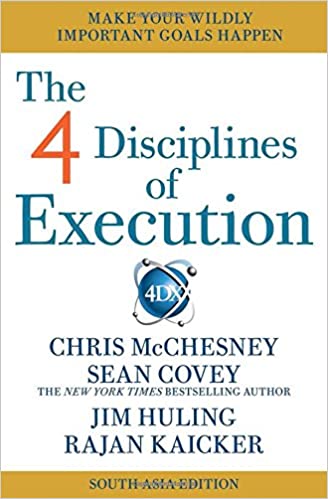The 4 Disciplines of Execution – Chris McChesney, Sean Covey and Jim Huling

“The 4 Disciplines of Execution” is a business management book that outlines a framework for achieving important goals in organizations
Focus on the Wildly Important
- Identify and prioritize one or two critical objectives that will have the most significant impact on your organization’s success.
- Avoid spreading resources too thin by attempting to tackle too many goals at once.
- Ensure that the objectives are clear, specific, and measurable, and communicate them to everyone in the organization.
The Importance of Focus
- Focus is critical to achieving success in any endeavor.
- Without focus, resources are spread too thin, and progress is slow or non-existent.
- To achieve focus, it is essential to identify the most important objectives and prioritize them above all others.
Creating a Culture of Execution
- To create a culture of execution, it is essential to align the entire organization around a common goal.
- This requires clear communication, regular feedback, and a willingness to make adjustments as needed.
- When everyone is working together towards a shared objective, progress is accelerated, and success is more likely.
The Role of Leadership
- Effective leadership is critical to the success of the 4 Disciplines framework.
- Leaders must model the behaviors they expect from others, hold team members accountable, and provide regular feedback.
- When leaders are fully committed to the effort, the organization is more likely to achieve its most important goals.
Implement the 4 Disciplines in Your Organization
- Introduce the four disciplines to your organization gradually, starting with a pilot project and then expanding.
- Build a sense of urgency and excitement around the effort, and celebrate successes along the way.
- Ensure that leaders at all levels are fully committed to the effort and model the behaviors they expect from others.
Act on Lead Measures
- Identify the actions that drive the accomplishment of your wildly important goal.
- Use lead measures, which are predictive of success, rather than lag measures, which are retrospective.
- Develop a scorecard that tracks progress on the lead measures and reviews it frequently.
Use the 4 Disciplines to Drive Individual Performance
- Encourage individuals to apply the 4 Disciplines to their personal goals and projects.
- Set clear, specific, and measurable objectives, and identify lead measures that are predictive of success.
- Track progress and hold yourself accountable for your commitments.
The Power of Lead Measures
- Lead measures are critical to achieving success in the 4 Disciplines framework.
- They allow you to track progress in real-time and make adjustments as needed.
- By focusing on lead measures, you can avoid getting bogged down in lag measures that only tell you how you did in the past.
Keep a Compelling Scoreboard
- Create a visual representation of the progress that is visible to everyone in the organization.
- Use a scoreboard that is simple, easy to understand, and focused on the most critical goals.
- Use colors, symbols, and other visual cues to make the scoreboard more engaging and memorable.
Create a Cadence of Accountability
- Establish a routine of frequent and regular progress meetings to review the scoreboard and make any necessary adjustments to your approach.
- Use these meetings to hold team members accountable for their commitments and to brainstorm solutions to any obstacles that arise.
- Keep the meetings brief, focused, and action-oriented.

